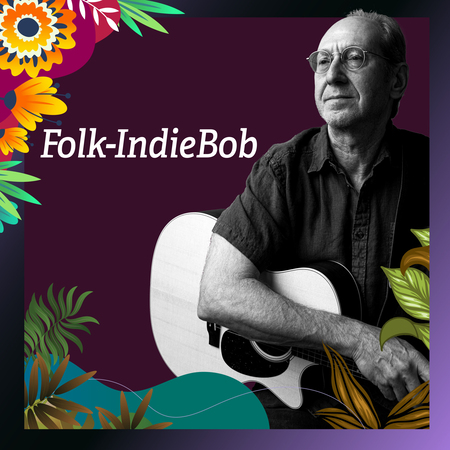
So here comes Bob Augustine, Folk-IndieBob to the unwashed, rolling out of Pittsburgh like some dude who’s just been through the wars and decided that the only weapon left worth carrying is an acoustic guitar. This record, Folk-IndieBob, isn’t trying to be clever, isn’t angling for Pitchfork stars or a sync deal on some Netflix teen drama. It’s bare. It’s bruised. And it’s the kind of album that will either make you want to hug the guy or smash your own head against the wall because he’s digging so deep into the muck you’d rather not remember.
The whole thing kicks off with “Fountain of Love” — not a hippie cliché, but a punch-drunk hymn to survival. “There’s a gold mine deep in my heart,” he sings, and you believe him because it doesn’t sound like Hallmark, it sounds like a man clawing his way through the storm to find a sliver of light. It’s Dylan stripped of surrealism, Prine without the smirk, just the raw confession.
And then you hit “The Candy Wrapper,” the lead single, the centerpiece, the sucker punch. Augustine compares himself to a candy wrapper—used, emptied, tossed aside. Sounds corny? Yeah, until you listen, and then you realize this is a grown man putting his heartbreak on the table like a bloodied rag. No production tricks, no ironic distance. Just a folk song that hurts because it dares to be simple and true.
The ghosts keep wandering. “Moon Song for Mary Ann” drifts in like a dream you can’t shake—lonely sidewalks, creaking stairs, waiting for someone who’s never coming back. Augustine doesn’t gild the lily; he leaves the raw space hanging, and it makes the song ache with absence. “Crystal Ball” takes that ache and stares straight into the void: “Please don’t let me see forever / cause I don’t want to know.” This isn’t the cosmic optimism of hippie folk; this is staring at your own reflection and seeing cracks you don’t want to trace.
But the darkness never swallows him whole. “All My Hope” rises like a quiet anthem, a reminder that you can still claw your way out from under the weight. It’s not sunshine and rainbows—more like the gritty, stubborn kind of hope you whisper to yourself when no one else is around. That song, more than any other, feels like Augustine’s manifesto: peace, love, happiness, yes, but only after a long fight with the shadows in your own head.
https://www.youtube.com/watch?v=QjO60iC6EVM
The back half of the record—“Jealous of Freedom,” “I’m In Love,” and “Four Leaf Clover”—show Augustine stretching out, flipping between intimacy and resilience. They’re not filler; they’re more like breaths between the heavier confessions. And that’s what makes Folk-IndieBob work: it’s not polished, not perfect, but it’s alive in that messy way only true folk records can be.
This album isn’t about reinvention. It’s about resurrection. Augustine quit music for decades, came back after loss, and now he’s throwing down songs like journal entries written in permanent ink. Folk-IndieBob is not background music—it’s a reminder that songs can still bleed, still console, still make you feel less alone in a world hell-bent on chewing you up and spitting you out.
So yeah, this record may not save the world. But it might save a night. And that’s enough.
–Leslie Banks
